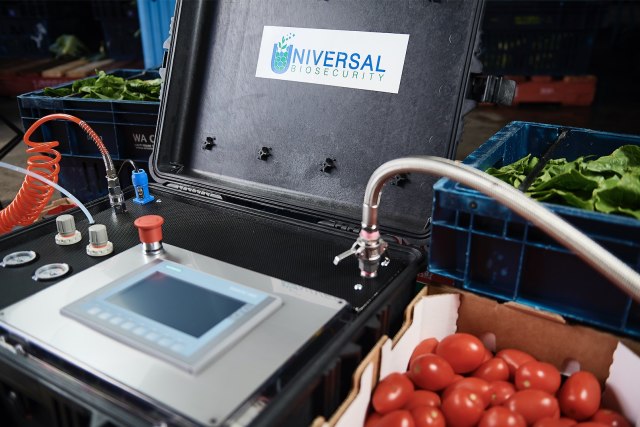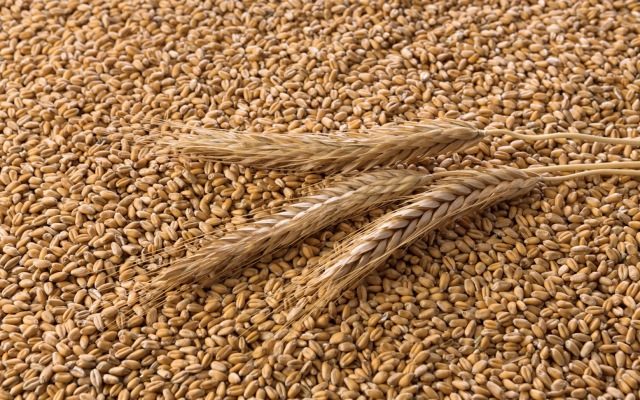Universal Biosecurity targets US$7bn global fumigation market with patented non-toxic pest control

Universal Biosecurity (ASX: UBL) is targeting the US$7 billion global fumigation market with its proprietary non-toxic pest control technology and plans to raise A$5 million in an upcoming IPO to commercialise its patented technology and bring to the market a highly sought after, cost-effective product.
The innovative fumigant developer was established to create alternatives to the toxic fumigants extensively used worldwide to control pests in grain storage, grain crops, fruit and vegetables, quarantine, and numerous other applications and commodities.
Making up part Universal Biosecurity’s board are Professors Young Lin Ren and Simon McKirdy who’ve both been researching and developing alternative non-toxic but effective fumigants for decades.
Speaking with Small Caps Universal Biosecurity managing director Simon Andrew said the company had identified ethyl formate as food-grade, non-toxic and environmentally-friendly fumigant option.
However, the ethyl formate had proved challenging until now due to its flammable properties.
After experimenting with how this could be mitigated, Universal Biosecurity developed its patented Fume8, which can deliver any liquid fumigant safely and efficiently – particularly, ethyl formate.

Universal Biosecurity’s patented Fume8 apparatus.
“Our patented technology mixes liquid ethyl formate with nitrogen gas to form an inert, non-flammable, non-toxic vapour,” Mr Andrew told Small Caps.
“Unlike other vaporisers, our system does not require a mixing chamber and is able to operate in a continuous manner – rather than a batch process,” he added.
The patented Fume8 technology has progressed through the prototype phase and is ready for commercialisation, which is why Universal Biosecurity plans to list on the ASX. Via its IPO, Universal Biosecurity hopes to raise A$5 million to fund further research and begin commercialising its technology.
What’s wrong with existing fumigants?
Current fumigants on the market are primarily toxic to humans and animals – creating a variety of challenges along the supply chain.
Mr Andrew said other problems with current fumigants include ozone depletion, pest resistance and cost.
“Methyl bromide and phosphine make up around half of the global fumigants market,” Mr Andrew stated.
He added methyl bromide had actually been banned under the Montreal Protocol in 2005 due to its impact on the ozone layer and its toxicity to humans.
As a result, world governments have been attempting to reduce its use, with some legislating against its use altogether and others regulating for recapture where it is used – such as ports. Having to recapture the fumigant can dramatically increase costs.
On the other hand, phosphine, which is also highly toxic to humans, is facing another issue – increasing pest resistance.
The chemical is widely used in Australia’s grains industry, with Universal Biosecurity estimating about 75% of Australian grain is treated with the product.
Despite its wide use, its effectiveness against pests is diminishing with Mr Andrew commenting that resistance had become “severe” in some areas.
Universal Biosecurity claims one of Australia’s larger bulk grain handlers spends up to A$200 million on fumigation a year.
In the fruit and vegetable space, due to the toxic residue often left on this produce, consumers have been turning to more expensive, but safer organic products.
ASX debut, life after IPO
At this stage, Universal Biosecurity expects to begin trading on the ASX on the early April, with the current offer due to close on 21 March.
Keen investors are asked to purchase the company’s stock at A$0.20 each to raise A$5 million.
The IPO funds will be directed into further research and development on the Fume8 over the next two years.
Fund will also go towards fees to protect Universal Biosecurity’s patent and provide general working costs.
Concurrent with the research, Universal Biosecurity will carry out customer engagement and education about Fume8 with ethyl formate along with trialling the product on a range of other commodities and pests within Australia and abroad.
Fume8 market and future plans
Initially, Universal Biosecurity will be targeting the grain storage industry in Australia and overseas and expanding into fruit and vegetables, with the product also believed effective against bed bugs and a host of other potential applications.
However, before Fume8 with ethyl formate can be sold on the market, Universal Biosecurity will need to submit efficacy data to Australia’s regulatory body to prove its formula works against a range of pests in specific commodities.
The company hopes to achieve this in 2019, along with gaining regulatory approvals in international markets with the US, China, South Korea, the European Union and New Zealand first in its sight.

Although efficacy data requires submission, Mr Andrew pointed out the science around the product’s effectiveness is “well-established” by previous work undertaken by the company’s board members.
Prior to commercialising Fume8 with ethyl formate, Universal Biosecurity will generate revenue by hiring out Professors Yong Lin Ren and Simon McKirdy as consultants, along with hardware sales and royalty income from two fumigators the company has already signed up.
Once commercialised, the ethyl formate formula will afford the company additional revenue streams via licencing the technology, fumigant supply partnerships, equipment rental, and creating portable systems for fruit and vegetable handlers and distributors.
Cost of biosecurity invasion
According to the CSIRO, out of 124 countries assessed to be at risk of a biosecurity invasion, Australia was marked 15th and classified as “high-risk”, with an invasion potentially costing the country US$7.8 billion.
There are currently no commercial alternatives to the highly toxic and pest-resistant products.
Advantages of Fume8 ethyl formate fumigant
In addition to being non-toxic, ethyl formate is environmentally friendly. Once used, it breaks down into naturally occurring products – formic acid (a food additive) and ethanol (alcohol).
The product also acts rapidly, is easy to store and transport, and has a reduced negative impact on plants.
Fumigation occurs at numerous steps along the supply chain which it can be a costly, but necessary evil.
Mr Andrew said he believes an additional opportunity for Universal Biosecurity’s Fume8 ethyl formate fumigant would be use for “in-transit fumigation”.
“Because our solution is non-toxic to humans, there is the potential to fumigate in-transit (trucks and ships), which could shorten an entire supply chain,” he stated, adding, “Using toxic fumigants means that fumigation must be carefully managed to avoid endangering workers.”
Fume8 ethyl formate would be able by-pass these precautions because it is non-toxic and environmentally friendly, which would boost efficiencies and lower costs.
Additionally, as Australian grain exporters struggle to compete with the influx of cheaper Black Sea grain from Russia and the Ukraine that is flooding its primary markets, a strong point of difference for Australian grain – other than quality – would be that it had been fumigated with a non-toxic food-grade and environmentally-friendly alternative.
This is even more pertinent as Australian grain export countries such as South Korea and China move away from toxic fumigation methods.
“In terms of the overall cost of fumigation, we think our system eventually combined with a branded ethyl formate fumigant will offer a cost-effective alternative,” Mr Andrews said.
